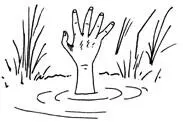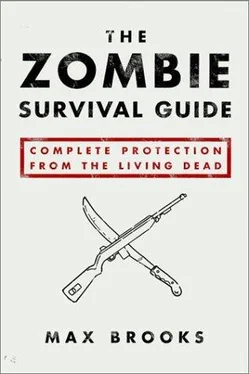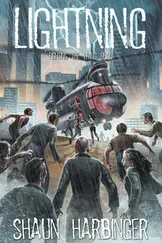Max Brooks - The zombie survival guide - complete protection from the living dead
Здесь есть возможность читать онлайн «Max Brooks - The zombie survival guide - complete protection from the living dead» весь текст электронной книги совершенно бесплатно (целиком полную версию без сокращений). В некоторых случаях можно слушать аудио, скачать через торрент в формате fb2 и присутствует краткое содержание. ISBN: , Издательство: Three Rivers Press, Жанр: Юмористическая фантастика, Юмористическая проза, на английском языке. Описание произведения, (предисловие) а так же отзывы посетителей доступны на портале библиотеки ЛибКат.
- Название:The zombie survival guide : complete protection from the living dead
- Автор:
- Издательство:Three Rivers Press
- Жанр:
- Год:неизвестен
- ISBN:1400049628
- Рейтинг книги:3 / 5. Голосов: 1
-
Избранное:Добавить в избранное
- Отзывы:
-
Ваша оценка:
- 60
- 1
- 2
- 3
- 4
- 5
The zombie survival guide : complete protection from the living dead: краткое содержание, описание и аннотация
Предлагаем к чтению аннотацию, описание, краткое содержание или предисловие (зависит от того, что написал сам автор книги «The zombie survival guide : complete protection from the living dead»). Если вы не нашли необходимую информацию о книге — напишите в комментариях, мы постараемся отыскать её.
The Zombie Survival Guide
The zombie survival guide : complete protection from the living dead — читать онлайн бесплатно полную книгу (весь текст) целиком
Ниже представлен текст книги, разбитый по страницам. Система сохранения места последней прочитанной страницы, позволяет с удобством читать онлайн бесплатно книгу «The zombie survival guide : complete protection from the living dead», без необходимости каждый раз заново искать на чём Вы остановились. Поставьте закладку, и сможете в любой момент перейти на страницу, на которой закончили чтение.
Интервал:
Закладка:
B. If soil and rain permits, dig a vegetable garden. This ready source of food should be consumed first, saving the canned food for an emergency. Keep it as far away from the latrines as possible, to avoid infection not by waste but by the residual effects that lime or bleach will have on the soil.
C. For electricity, always resort to the manual (bicycle-powered) generator. Not only is the gasoline model loud and potentially dangerous—its fuel is finite. Use it only in extreme circumstances, such as a night attack, when manual power is unfeasible or impossible to generate.
D. Patrol the wall constantly. If you’re in a group, run patrols on a twenty-four-hour basis. Always be vigilant for an unlikely but possible infiltration. If you are alone, limit your patrols to daylight hours. At night, make sure all doors are secure (windows should already be barred). Sleep with a flashlight and weapon nearby. Sleep lightly.
E. Maintain a low profile. If you have a basement, do your cooking there, along with power generation and any equipment maintenance. When you monitor the radio, something that should be done every day, use headphones. Keep blackout curtains on all windows, especially at night.
F. Dispose of all bodies. Be it zombie or human, a corpse is still a corpse. The bacteria in rotting flesh can be a serious health hazard. All bodies within your perimeter should be burned or buried. All bodies outside of your wall should be burned. To do this, simply stand on a ladder on your side of the wall, pour gasoline on the freshly slain ghoul, light a match and let it fall. Although this may attract more undead to your dwelling, it is a necessary risk to remove an already-present hazard.
G. Exercise daily. Use of the stationary bicycle, along with basic calisthenics and dynamic tension, will keep your body fit and strong enough for any combat situation. Again, make sure your regimen is quiet. If a basement is not available, use a room in the center of the house. Basic soundproofing such as mattresses and blankets against the walls will help to muffle any sounds.
H. Remain entertained. Despite the need for vigilance, recreation is a must. Make sure a large cache of books, games, and other forms of amusement are available (electronic games are too noisy and energy-inefficient to be considered). In a long and seemingly interminable siege, boredom can lead to paranoia, delusion, and hopelessness. It is as important to keep your mind in good shape as it is your body.
I. Keep your earplugs handy, and use them often. The constant, collective moan of the undead, a sound that will persist at all hours for as long as the siege continues, can be a deadly form of psychological warfare. People with well-protected, well-supplied homes have been known to either kill one another or go insane simply from the incessant moan.

J. Make sure your escape route is planned and your gear ready to go. In the uncertainty of battle, it may be necessary to abandon your home. Perhaps the wall has been breached, perhaps a fire has started, perhaps rescue has arrived but is not close enough. For whatever reason, it’s time to go. Keep your survival pack and weapon in a readily accessible area, packed, loaded, and ready for action.

4. Immediate Defense
The dead have risen. You smell the smoke, hear the sirens. Screams and shots fill the air. You have been unable or unwilling to properly prepare your home—what now? Although the situation looks grim, it by no means signals your demise. If you take the right actions at the right time, you can save yourself and your family from joining the ranks of the undead.

A. Strategies for Two-Story Homes
1. Lock all your doors and windows. Although a pane of glass may not stop a zombie, the sound of its shattering will be the best warning you can get.
2. Run upstairs and turn on the bathtub. Although this sounds foolish, there is no way of knowing when the water will be cut. After a few days, thirst will become your greatest enemy.

3. Find the best weapons possible. (See previous chapter.) They should be light and, if possible, attachable to your body so you will have the full use of your hands. Those will be busy for the next hour.
4. Begin stockpiling the second story. Use the list on pages 71–72 as your guide. Most households have at least 50 percent of the items listed. Do a quick inventory to see what you have. Don’t take everything, just the bare essentials: one or two weapons, some food (you already have a bathtub full of water), a flashlight, and a battery-powered radio. And since most families keep their medical chests upstairs, you won’t need anything more. Remember: Time could be short, so don’t spend it all gathering supplies when the most important job is still ahead.
5. Demolish the staircase! As zombies are unable to climb, this method guarantees your safety. Many have argued that an easier solution would be to board up all the windows and doors. This method is self-defeating because it would take only a few zombies to break through any homemade barricade. No doubt destroying your staircase will take time and energy, but it must be done. Your life depends on it. Do not, under any circumstances, try to burn your stairs away with the hope of controlling the fire. Several people have attempted to save time in this way; their efforts have ended in either death by fire or the total destruction of their home.
6. If you have a ladder, use it to continue to stock your upstairs refuge. If not, catalog what you do have, fill all sinks and other receptacles with water, and prepare for a long wait.
7. Stay out of sight. If you listen to the radio, do it at a minimum volume. When the skies darken, do not turn on the lights. Do not go near the windows. Try to make it seem as if the house has been abandoned. This may not stop a random zombie intrusion, but it will help to discourage a mass congregation from descending upon your home.
8. Do not use the phone. As in all disasters, the lines will probably be tied up. One more call only contributes to clogging the system. Keep the ringer on the lowest setting. If a call does come through, by all means answer it, but do so quietly.
9. Plan an alternate escape. You may be safe from zombies but not from fire. If a gas line bursts, or some fool down the street goes crazy with a Molotov, you may have to abandon your home. Find a bag or other means of carrying essentials (see “On the Run”), and keep it at the ready.
B. Strategies for Single-Story Homes
If you do not live in a two-story house, the attic will be a less comfortable but equally secure substitute. Most can be secured by simply raising the retractable staircase or removing the temporary ladder. Zombies lack the cognitive ability to build a ladder of their own. If you stay quiet, they will not even know that an attic exists.

Never use a basement as a shelter. Popular horror flicks have shown that, in a crunch, this subterranean chamber can protect the living from the dead. This is a dangerous fallacy. Burning, suffocating, or simply starving to death in basements have claimed hundreds of lives over the years.
Читать дальшеИнтервал:
Закладка:
Похожие книги на «The zombie survival guide : complete protection from the living dead»
Представляем Вашему вниманию похожие книги на «The zombie survival guide : complete protection from the living dead» списком для выбора. Мы отобрали схожую по названию и смыслу литературу в надежде предоставить читателям больше вариантов отыскать новые, интересные, ещё непрочитанные произведения.
Обсуждение, отзывы о книге «The zombie survival guide : complete protection from the living dead» и просто собственные мнения читателей. Оставьте ваши комментарии, напишите, что Вы думаете о произведении, его смысле или главных героях. Укажите что конкретно понравилось, а что нет, и почему Вы так считаете.











